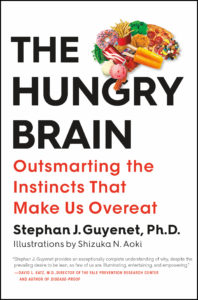Sometimes, a meta-analysis (quantitative study of studies) is just what the doctor ordered to inoculate us against the shortcomings of our own cognition. When a topic has been studied extensively and it has produced many studies of varying quality, this lends itself to incorrect conclusions because we can find studies to support almost any belief. This is problematic because we naturally tend to gravitate toward evidence that reinforces pre-existing beliefs, and away from evidence that challenges beliefs. Called confirmation bias, this phenomenon afflicts all of us and has to be actively managed if we want to arrive at reliable knowledge. Systematically examining a body of evidence and integrating it mathematically is a useful tool for combating this bias. A new meta-analysis examines the effect of carbohydrate vs. fat calories on energy expenditure and body fatness, giving us the most objective view of this question to date.
The impact of weight loss on the drive to eat
Weight loss engages a “starvation response” that acts to regain the lost weight, and this is a key reason why weight loss is difficult and often temporary. This starvation response includes an increase in the drive to eat and a decrease in calorie expenditure. Using a clever study design, Kevin Hall and colleagues recently quantified the contribution of eating drive to this starvation response. The results suggest that increased eating drive is the primary way in which the starvation response opposes weight loss.
Book Review: Syndrome X, The Silent Killer
Gerald Reaven is the researcher who first identified the state of insulin resistance and played a central role in defining its consequences. Understanding insulin resistance is worthwhile, and if we want to do so, his work is one of the most informative places to look. I recently read his general-audience book Syndrome X: The Silent Killer, and I’ll share my thoughts on it in this review.
Bad sugar or bad journalism? An expert review of “The Case Against Sugar”.

I’ve been asked by a number of people to review Gary Taubes’s new book, The Case Against Sugar. I reluctantly agreed that it would probably be a good idea for me to do so. In this post, I’ll provide something that is not available anywhere else (to my knowledge): a review of the book from the perspective of a former researcher who is an expert in some of the topics it discusses. [update 7/22/17: there is now a second detailed expert review of the book available here]
The Case Against Sugar is a journey through sugar history and science that argues the point that sugar is the principal cause of obesity, diabetes, coronary heart disease, and many other common noncommunicable diseases. This differs from the prevailing view in the research and public health communities that obesity and noncommunicable disease are multi-factorial, with refined sugar playing a role among other things like excess calorie intake, physical inactivity, cigarette smoking, alcohol and illegal drug use, and various other diet and lifestyle factors. I side with the latter view. In case anyone is wondering, I’ve never had any contact with the sugar industry and I have no other relevant conflicts of interest.
I’ll break the review into two parts, the first covering the historical aspects of the book, and the second covering its scientific aspects.
Book Update
 Hello, folks. My book, The Hungry Brain: Outsmarting the Instincts that Make Us Overeat is due to be released on February 7, and I’m very excited about it. It’s substantially different from any other book on overeating and weight management, and I believe it will inject much-needed information into the public discourse on obesity. Given that the brain governs all behavior including eating, it’s remarkable that no other general-audience book has looked broadly at its role in overeating and body weight (to my knowledge). The Hungry Brain is based on thirty-six expert interviews, hundreds of scientific papers, and my own scientific expertise. My goal is to give you the best that neuroscience, obesity research, and my noggin have to offer.
Hello, folks. My book, The Hungry Brain: Outsmarting the Instincts that Make Us Overeat is due to be released on February 7, and I’m very excited about it. It’s substantially different from any other book on overeating and weight management, and I believe it will inject much-needed information into the public discourse on obesity. Given that the brain governs all behavior including eating, it’s remarkable that no other general-audience book has looked broadly at its role in overeating and body weight (to my knowledge). The Hungry Brain is based on thirty-six expert interviews, hundreds of scientific papers, and my own scientific expertise. My goal is to give you the best that neuroscience, obesity research, and my noggin have to offer.
The Hungry Brain has received outstanding reviews from The New York Times, Publisher’s Weekly, and many knowledgeable individuals. You can read excerpts on my book page.
I’ll be doing a book reading and signing at The Elliott Bay Book Company in Seattle on February 8 at 7:00 pm. Come hear me read a bit from the book, expand on one of the topics in it, and take questions.
Behind the scenes, my publicist and I are cooking up a few strategies to help get the word out. In the coming weeks, I’ll be appearing in a number of interviews. I may do a Reddit AMA. If you think my work is valuable, please spread the word!
Did the US Dietary Guidelines Cause the Obesity Epidemic?
A popular argument holds that the US Dietary Guidelines caused our obesity epidemic by advising Americans to reduce fat intake. Does the evidence support this idea, or is it simply a fantasy?
- « Previous Page
- 1
- …
- 3
- 4
- 5
- 6
- Next Page »